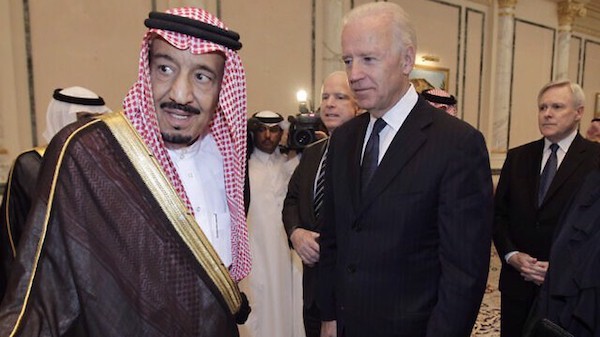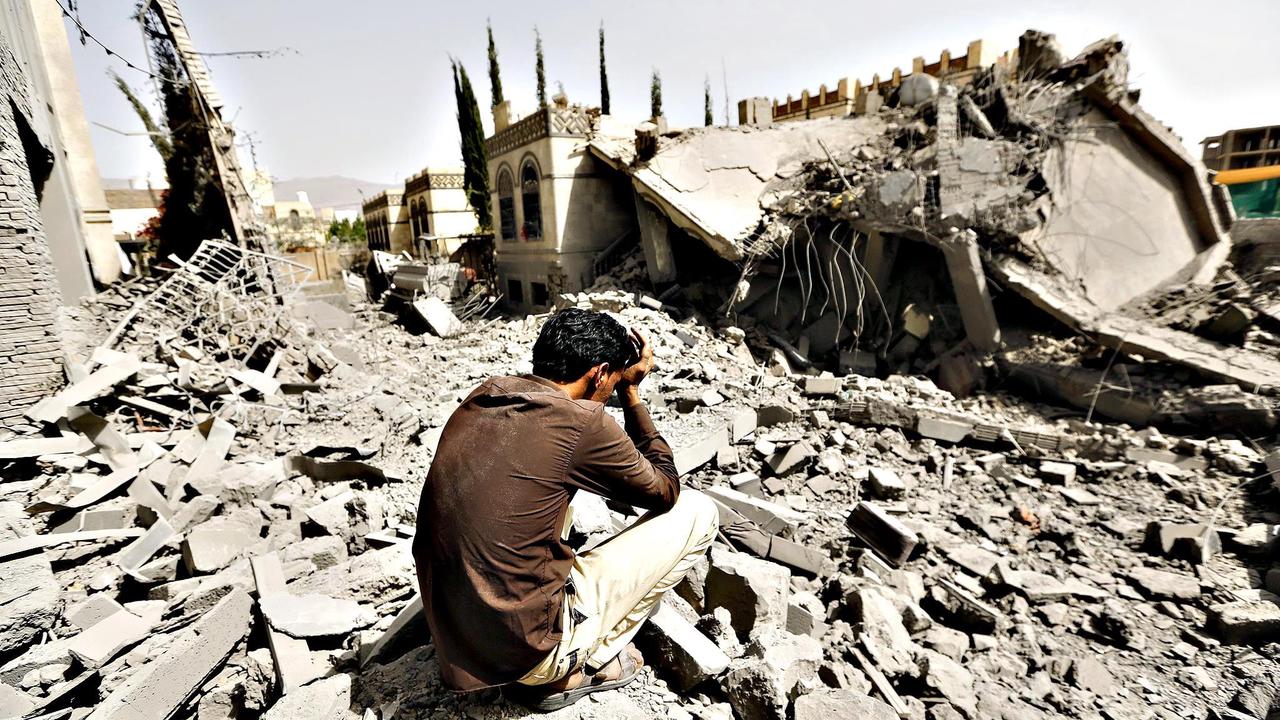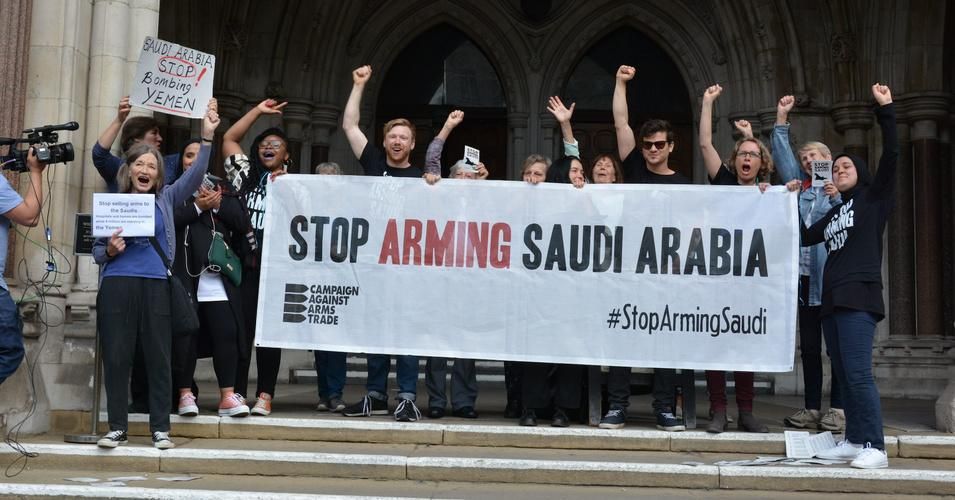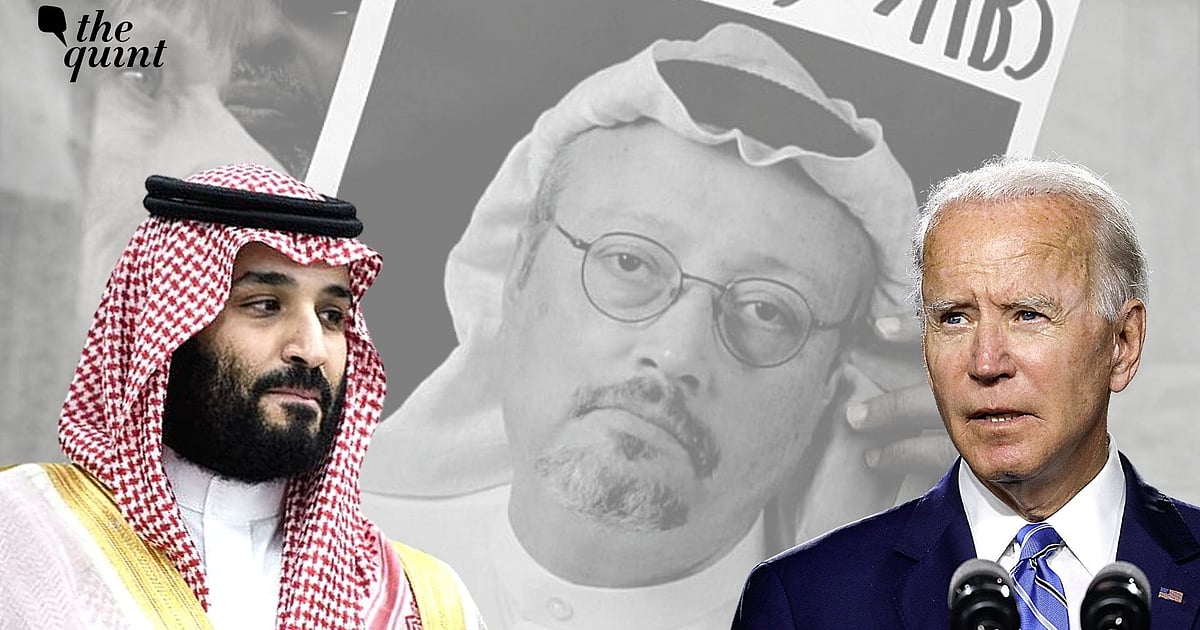
Actions Don’t Match Rhetoric on Changing Saudi Policy
TheCenter for International Policy
(December 2, 2021) — The Center for International Policy released a new report today calling on the Biden administration to end US military support for Saudi Arabia as leverage to get it to end its devastating blockade in Yemen and negotiate in good faith to end the war there.
“Without US arms, maintenance, and spare parts, the Saudi military would not be able prosecute its brutal war in Yemen. It’s hard to overstate the degree to which the Saudi military relies on US support,” noted William D. Hartung, the author of the report. “It’s time for the Biden administration to cut off this support as a way to change Saudi conduct and relieve the suffering of the Yemeni people caused by Saudi actions.”
The report comes as the Senate is poised to vote on a resolution co-sponsored by Senators Rand Paul (R-KY), Mike Lee (R-UT), and Bernie Sanders (I-VT) that would block the Biden administration’s recent offer of $650 million in air-to-air missiles and related equipment to Saudi Arabia. A summary of the report is below.

SUMMARY
During the Trump administration, the United States doubled down on its support of the regime in Saudi Arabia, regardless of how harshly the Kingdom cracked down on human rights or how much devastation it caused through its war in Yemen.
Early on, it appeared that President Biden would depart from the Trump administration’s cynical, transactional approach to US-Saudi relations, but the Biden administration’s record so far has been mixed at best. The administration has halted two bomb sales to the Saudi regime, but it has offered $500 million in crucial maintenance and support for Saudi aircraft and continued the flow of US arms offers already in the pipeline.
The administration has also made a $650 million offer of air-to-air missiles to the Saudi Royal Air Force. Most importantly, the Biden administration has refused to use US leverage — in the form of a threat to cut off crucial US spare parts and sustainment for the Saudi military — to force Riyadh to end its devastating blockade on Yemen and move towards an inclusive peace agreement to end the war.
The bulk of the weapons transferred to Saudi Arabia since 2009 date back to deals made during the Obama administration. Arms sales offers to the Kingdom totaled over $118 billion during the eight years of the Obama administration, compared with $25 billion during the four years of the Trump administration and $1.1 billion so far in the first year of the Biden term.
The most damaging deals of the Trump years involved transfers of tens of thousands of precision-guided bombs that were pushed through despite opposition from a majority of the members of Congress.
Saudi Arabia has used US bombs to target and kill thousands of civilians in Yemen, and to enforce its blockade there by carrying out actions like bombing the runway of Yemen’s main airport in Sana’a. Two offers of bombs made late in Trump’s term, in December 2020, were halted by the Biden administration.
It’s hard to overstate the degree to which the Saudi military relies on US weapons and related support. The bulk of the Saudi arsenal is made in the US, including nearly two-thirds of its combat aircraft, nearly four-dozen attack helicopters, and over 2,300 heavy armored vehicles.
Without US maintenance and spare parts, the Royal Saudi Air Force (RSAF) would be grounded in short order, as noted by Bruce Riedel of the Brookings Institution. Since 2018, the United States has entered into contracts worth more than $10 billion to supply spare parts, maintenance, and other support for Saudi aircraft.
The US has trained over 21,000 Saudi military personnel since 2009, including a $4 billion contract to arm and equip the Saudi Arabian National Guard (SANG), which is responsible for internal security but has also been involved in the war in Yemen. These figures do not include training purchased by Saudi Arabia through direct commercial arrangements with US companies. Such was the case with the Tier 1 group, which trained four Saudi operatives who went on to play a role in the 2018 murder of US-resident Saudi journalist and Washington Post columnist Jamal Khashoggi.
The greatest beneficiaries of US arms offers to Saudi Arabia over the past decade have been major contractors like Boeing, Raytheon, Lockheed Martin, and General Dynamics. All of the largest sales since 2009, including a $29 billion deal for Boeing F-15 aircraft, a $25 billion deal for Boeing Apache helicopters, a $15 billion deal for a Lockheed Martin THAAD missile defense system, $10 billion deal for Lockheed Martin Multi-Mission Surface Combatant ships, a $5.4 billion deal for Raytheon PAC-3 missile defense interceptors, and a $1.57 billion deal for Raytheon Paveway bombs involved one of the four firms mentioned above as the primary supplier.
An excerpt from the report follows: The full report can be accessed here.
Arming Repression: US Military Support
For Saudi Arabia, From Trump to Biden

William D. Hartung / Center for International Policy
INTRODUCTION
The United States doubled down on its support for Saudi Arabia during the Trump administration despite harsh crackdowns on human rights activists and the regime’s role in the ongoing war in Yemen. In a move that surprised diplomats and foreign policy experts alike, Trump chose Saudi Arabia as the location for his first foreign visit as president.
Once in Riyadh, Trump posed as a deal-maker par excellence, persuading the Saudis to pledge to buy $110 billion in US weaponry and crowing that the arrangement would create “jobs, jobs, jobs” in the United States. His claims of the size of the arms deal and the benefits for US employment were greatly exaggerated, but Trump nevertheless touted the jobs for US workers and revenues for US contractors owing from the US-Saudi military relationship even in the wake of the regime’s October 2018 murder of US-resident Saudi journalist and dissident Jamal Khashoggi:
“$110 billion will be spent on the purchase of military equipment from Boeing, Lockheed Martin, Raytheon and many other great US defense contractors. If we foolishly cancel these contracts, Russia and China would be the enormous beneficiaries — and very happy to acquire all of this newfound business. It would be a wonderful gift to them directly from the United States!”
Trump’s statement ignored the fact that given its overwhelming dependence on arms from the US and the United Kingdom, Saudi Arabia could not readily switch to Russian or Chinese supplies in the absence of US support without sidelining large parts of its military, but it was a clear example of his willingness to offer a blank check to the Saudi regime regard- less of its conduct.
President Trump also defended the Saudi regime against its critics in Congress, vetoing bi- partisan initiatives that would have blocked US military support for the Saudi/UAE-led war in Yemen and stopped a major sale of precision-guided bombs. Perhaps even more egregiously, a report by the State Department’s Office of Inspector General (OIG) found that the Trump administration was intentionally continuing billions of dollars of controversial arms sales at dollar values below those requiring Congressional notification, including for weapons that had been objected to by Congress.

Early on, it appeared that President Biden would depart from the Trump administration’s cynical, transactional approach to US-Saudi relations. As a candidate for president, Biden called Saudi Arabia a “pariah” and pledged to end US arms sales to the Saudi military.
In his early weeks in office, he rescinded the Trump administration’s designation of the Houthi opposition in Yemen as a foreign terrorist organization, easing the way for delivery of desperately needed humanitarian aid. He chose the occasion of his first foreign policy speech to announce that the US would no longer provide support for “offensive operations” in Ye- men, along with suspending “relevant arms sales.”
In keeping with this pledge, the Biden administration suspended two deals for guided bombs destined for the Royal Saudi Air Force. He also released intelligence information on the role of Saudi leader Mohammed Bin Salman in directing the murder of Jamal Khashoggi. The foundations of a new US approach to the Saudi regime appeared to be in place.
So far, the Biden administration’s actions towards Saudi Arabia have not lived up to its rhetoric. The administration has refused to provide substantive answers to Congressional requests for a definition of what it means by arms sales relevant to offensive operations in Yemen, and other than pausing the two bomb offers mentioned above, there is no evidence it has done anything to slow deliveries of billions of US arms for Saudi Arabia that are al- ready in the pipeline. Even worse, in September it announced a new deal for $500 million in maintenance and spare parts for the Saudi military, support that enables them to wage
a brutal war in Yemen, which according to the United Nations has contributed directly and indirectly to the deaths of nearly a quarter of a million people since it began in March 2015.
Bruce Riedel of the Brookings Institution summed up the Biden record to date as follows: “I think the Saudis are showing their utter contempt for Joe Biden’s human rights policy [. . .] They’ve had more than eight months now to size up the administration and they’ve come to the conclusion that it’s not serious on this issue.”
Perhaps worst of all, the Biden administration has failed to do everything it can to end the Saudi blockade of Yemen, a primary cause of the humanitarian catastrophe in that nation. The administration’s special envoy for Yemen Timothy Lenderking has denounced any actions that impede the delivery of humanitarian aid or commercial goods to Yemen, but the administration has not used maximum leverage to end the blockade, which should include cutting o arms sales, maintenance, and spare parts, as called for in a successful amendment to the House version of the National Defense Authorization Act sponsored by Rep. Ro Khanna (D-CA) . . . . .
/cdn.vox-cdn.com/uploads/chorus_image/image/62377486/935180874.jpg.0.jpg)
SUMMARY AND RECOMMENDATIONS
During the Trump administration, the United States doubled down on its support of the regime in Saudi Arabia, regardless of how harshly the Kingdom cracked down on human rights or how much devastation it caused through its war in Yemen. Early on, it appeared that President Biden would depart from the Trump administration’s cynical, transactional approach to US-Saudi relations, but the Biden administration’s record so far has been mixed at best.
The administration has halted two bomb sales to the Saudi regime, but it has offered $500 million in crucial maintenance and support for Saudi aircraft and continued the flow of US arms offers already in the pipeline. The administration has also made a $650 million offer of air-to-air missiles to the Saudi Royal Air Force. Most importantly, the Biden administration has refused to use US leverage — in the form of a threat to cut o crucial US spare parts and sustainment for the Saudi military — to force Riyadh to end its devastating blockade on Yemen and move towards an inclusive peace agreement to end the war.

MAJOR FINDINGS
• The bulk of the weapons transferred to Saudi Arabia since 2009 date back to deals made during the Obama administration. Arms sales o ers to the Kingdom totaled over $118 billion during the eight years of the Obama administration, compared with $25 billion during the four years of the Trump administration and $1.1 billion so far in first year of the Biden term.
- The most damaging deals of the Trump years involved transfers of tens of thou- sands of precision-guided bombs that were pushed through despite opposition from a majority of the members of Congress. Saudi Arabia has used US bombs to target and kill thousands of civilians in Yemen, and to enforce its blockade there by carrying out actions like bombing the runway of Yemen’s main airport in Sana’a. Two offers of bombs made late in Trump’s term, in December 2020, were halted by the Biden administration.
- It’s hard to overstate the degree to which the Saudi military relies on US weapons and related support. The bulk of the Saudi arsenal is made in the US, including nearly two-thirds of its combat aircraft, nearly four-dozen attack helicopters, and over 2,300 heavy armored vehicles.
- Without US maintenance and spare parts, the Royal Saudi Air Force (RSAF) would be grounded in short order, as noted by Bruce Riedel of the Brookings Institution. Since 2018, the United States has entered into contracts worth more than $10 billion to supply spare parts, maintenance, and other support for Saudi aircraft.
- The US has trained over 21,000 Saudi military personnel since 2009, including a $4 billion contract to arm and equip the Saudi Arabian National Guard (SANG), which is responsible for internal security but has also been involved in the war in Yemen. These figures do not include training purchased by Saudi Arabia through direct commercial arrangements with US companies. Such was the case with the Tier 1 group, which trained four Saudi operatives who went on to play a role in the 2018 murder of US-resident Saudi journalist and Washington Post columnist Jamal Khashoggi.
- The greatest beneficiaries of US arms offers to Saudi Arabia over the past decade have been major contractors like Boeing, Raytheon, Lockheed Martin, and General Dynamics. All of the largest sales since 2009, including a $29 billion deal for Boeing F-15 aircraft, a $25 billion deal for Boeing Apache helicopters, a $15 billion deal for a Lockheed Martin THAAD missile defense system, $10 billion deal for Lockheed Mar- tin Multi-Mission Surface Combatant ships, a $5.4 billion deal for Raytheon PAC-3 missile defense interceptors, and a $1.57 billion deal for Raytheon Paveway bombs involved one of the four rms mentioned above as the primary supplier.
RECOMMENDATIONS

In the interests of ending US support for the Saudi war in Yemen, the Biden administration should do the following:
1. Suspend all US arms sales and military support to the Saudi regime — both new offers and systems still in the pipeline and yet to be delivered — as leverage to get Riyadh to end its blockade on humanitarian aid and commercial goods into Yemen, open Sana’a airport, and engage in good faith e orts to end the war.
2. Absent an immediate halt to arms flows, the administration should provide timely data on pending arms deliveries to the Saudi military to give Congress the opportunity to review and if necessary block specific transfers.
For its part, Congress should do the following:
- Force an end to all US military support for Saudi Arabia by passing a War Powers Resolution in both houses of Congress.
- Pass legislation to end all US arms, maintenance and spare parts to the Saudi regime.
- Make it easier to block future sales to Saudi Arabia and other human rights abusers by requiring affirmative Congressional approval of key arms sales, as opposed to the current approach, which calls for veto-proof, joint resolutions of disapproval in both houses of Congress.
Note: The full report can be accessed here
William D. Hartung is the director of the Arms and Security Program at the Center for International Policy: 2000 M Street NW, Suite 720 • Washington, DC 20036.
Posted in accordance with Title 17, Section 107, US Code, for noncommercial, educational purposes.